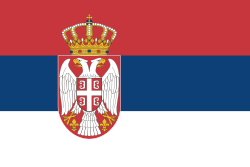Slogans
- "Kosovo is Serbia" (Косово је Србија / Kosovo je Srbija), slogan and catch-phrase used in Serbia since Kosovo's 2008 declaration of independence.
- "Serbia to Tokyo" (Србија до Токија / Srbija do Tokija), slogan and catch-phrase used by both Serbian nationalists (to taunt rival neighbouring ethnic groups) and Serbs (jokingly mocking Serb exceptionalism) alike.




